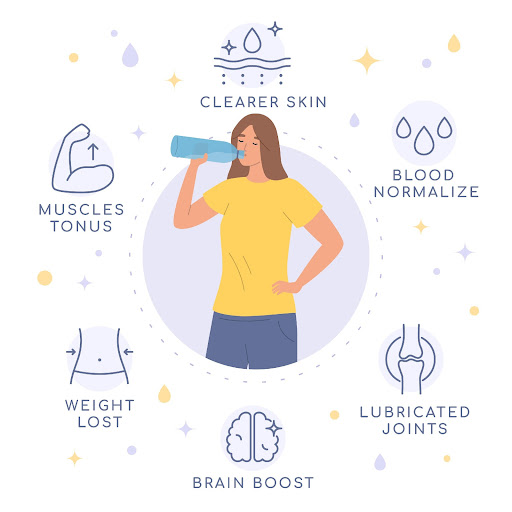Disclaimer:
This article is for information purposes only. It is not a substitute for medical advice or treatment. Seek medical care for your treatment.
What is dehydration?
Your body daily loses more fluids through sweating and urination than it takes in. If the lost water is not restored, you will get dehydrated and your body will fail to work properly.
Significance of water:
Water is imperative for every cell of our body to function appropriately. Your digestive system works better with sufficient hydration, averting constipation. Water also cleanse your body toxins, encourages good kidney function, keeps your joints and muscles moisturized, promotes healthier and fresh skin and help regulates your body temperature. Your daily recommended water intake should be:
- Women: 11.5 cups or 92 ounces
- Men: 15.5 cups or 124 ounces
Anyone can become dehydrated but some people have greater chances, including infants, older adults, children and people who do extreme workout. Dehydration ranges from mild to severe. Severe dehydration needs immediate treatment.
Causes of Dehydration:
- Fever
- Persistent vomiting or diarrhea
- Frequent urination
- Intense sweating
- Intake of certain medications that lead to dehydration
5 tips for preventing dehydration:
To avert dehydration, drink ample of fluids and consume food rich in water such as fruits and certain vegetables. Don’t wait to be thirsty, it often leads to dehydration.
- Flavor it up:
Some people find it very hard to drink required water as per a day. They can’t consume plain water for more than 3 glasses. All liquids count when it comes to hydration for example, sugar free coffee, fresh juice, tea, seltzer, carbonated water. But, remember that sweetened juices and teas can’t beat the healthiness of water. You can simply up your water game by adding fresh fruits to your water like lemons, limes, cucumber are also scrumptious options. Fruits such as, cantaloupe, strawberries and watermelon are 90-99% water, whereas, apples, grapes, oranges and pineapples are 80-89%water.
- Try to stay hydrated in hot weathers:
It is suggested to stay active about being hydrated if you work outside. You don’t want to drink all the required water at once. You should start drinking water before you even feel the need of drinking water. In hot and humid weather drink one cup of water after every 15-20 minutes. Avert drinking more than 48 ounces of water or other sports drink because this can reduce the amount of salt in your blood. Always remember to hydrate after work to restore what you might have lost while doing physical activity.
- Enhance your daily water intake while exercising:
Your body needs plenty of water especially when you are exercising or doing intense workout. It is suggested that an athlete can lose up to 10% of their body water via sweating during an athletic event.
Football players lose approximately, 1.5 liters of sweat every hour. Best is to develop a daily routine to drink plenty of water. Remember to drink water after you brush your teeth, before going to the bathroom or taking your meal. Make it your habit to drink water.
- Bring in extra electrolytes:
Ample water is enough to avert dehydration but certain situations demand for something else. People who engage in any physical activity for more than 60 minutes need required electrolytes. Sports drink, drinks with sodium or carbohydrates can help recover your electrolytes. Milk having sodium, carbohydrate and protein content can help with rehydration. William suggests to drink about 4-8 fl oz of low-carb electrolyte beverage after every 15-20 minutes when exercising for more than an hour. It is advised to take low sugar or calorie free version. You can make your own rehydration drink using exact measurements that are mentioned below:
- ½ teaspoon salt
- 6 teaspoons sugar
- 1 liter water
- Buy a new bottle and Drink plenty of fluids if you are ill:
Firstly purchase a nice, high-tech water bottle that connects to your smart phone or smart watch. By doing this you can get a record of how much water you drink in a day and can easily set a reminder to drink water. Sometimes when we go outdoors we find it daunting to have plenty of clean water. Before leaving fill up your bottle and take it along wherever, you travel.
If you are having vomiting and diarrhea increase your liquid intake. Even if you are inactive still, you should drink ample fluids.
Averting dehydration in kids and children:
If your child is very active or it’s a hot and muggy day, make certain that your child drinks plenty of fluids because they also lose body fluids and electrolytes just like adults. Try to give your child fruits and vegetables with more water content. You can go for mild sports drinks like Pedialyte or Equalyte if you child is dehydrated. If any solution is not available give them small swigs of water and avoid giving them your homemade version of it. Consult your pediatrician in case your child is not getting better.
Preventing dehydration in adults:
Older adults lives are more at risk because they cannot store plenty water. Some useful tips to follow:
- Try to drink ample water throughout the day. Don’t wait to be thirsty.
- Make certain that water is accessible all the time.
- At least drink 7-8 glasses of water a day but keeping the high temperature in mind you can drink more water.
- We get plenty of fluids from our meal so don’t skip any of your meal.
- Avert protein rich drinks or alcoholic beverages and drink spots drinks, milk and broth or soup.
- Restrict coffee, alcohol or caffeinated drinks.
Conclusion:
Dehydration can easily happen from intense exercise, hot and muggy weather or any illness. If not treated properly in time dehydration can be really dangerous.
Simple is not to wait to be thirsty to drink water. Try to keep yourself hydrated by consuming plenty of water and taking required electrolytes.




